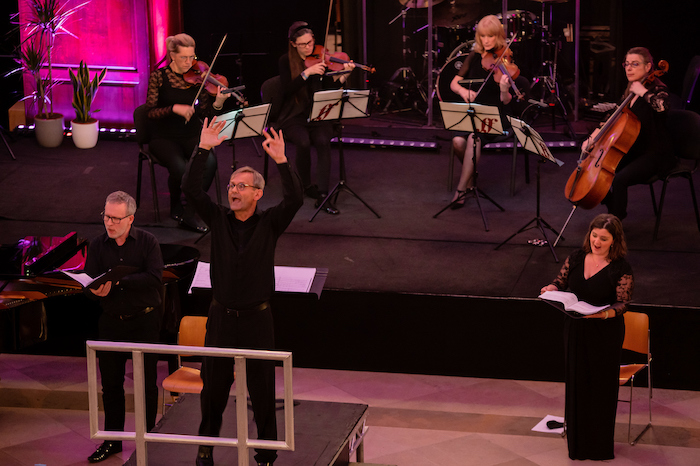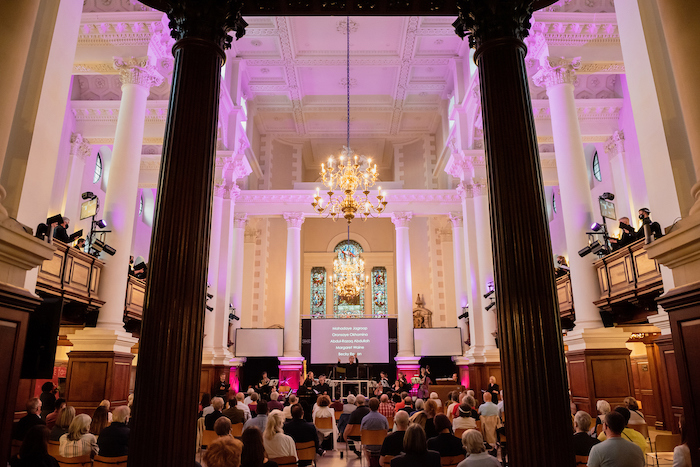Never to Forget, Spitalfields Festival review – moving musical tributes to lost care and health workers | reviews, news & interviews
Never to Forget, Spitalfields Festival review – moving musical tributes to lost care and health workers
Never to Forget, Spitalfields Festival review – moving musical tributes to lost care and health workers
Premieres by Howard Goodall and Errollyn Wallen speak for the power of live music

During early lockdown in 2020 Howard Goodall published an article pondering the role of the composer in a pandemic. His answer was that music has throughout history been successful at memorialising people and events, and that it could do so again.
It is some senses hard to critique as a piece of music. Goodall foregrounds the names and largely keeps the music out of the way. The names are sung by the choir with simple melodic outlines, sometimes in antiphony, sometimes in chordal textures, sometimes by solo singers, with an accompaniment from a small chamber ensemble. The music is undemonstrative, in Goodall’s familiar warm, cathedrally style, with some effective solo writing for the cello. But it doesn’t draw attention to itself, content to be a vessel for the transmission of the names.
 The 70 masked singers were arrayed around the gallery, with conductor Simon Halsey having to work in 360 degrees, with the names projected on a screen. Care had clearly been taken to pronounce the names correctly and it felt like a sincere and committed tribute to the dead. As Goodall said in a powerful introductory speech, “each of these names we cherish and honour – we sing these names with love and gratitude”. Although performed in a church, Never to Forget felt like an appropriately secular tribute to a group of people clearly hugely varied in cultural and national origin, and was in that sense a model of how such a thing can be done.
The 70 masked singers were arrayed around the gallery, with conductor Simon Halsey having to work in 360 degrees, with the names projected on a screen. Care had clearly been taken to pronounce the names correctly and it felt like a sincere and committed tribute to the dead. As Goodall said in a powerful introductory speech, “each of these names we cherish and honour – we sing these names with love and gratitude”. Although performed in a church, Never to Forget felt like an appropriately secular tribute to a group of people clearly hugely varied in cultural and national origin, and was in that sense a model of how such a thing can be done.
The other item in the programme was the premiere of Errollyn Wallen’s After Winter, in which choral songs are interspersed between numbers from Winter Journey, a new English translation of Schubert’s Winterreise. Commissioned by the Middlesbrough group Streetwise Opera, who create projects with homeless people, the 2020 premiere was cancelled and Spitalfields stepped in to prevent it disappearing completely. The conceit of the piece is that where Schubert’s lone traveller sings of loss and despair, the choir “open their arms to him in welcome and sing of hope, new beginnings and joy”.
 The Schubert was sung – magnificently – by Roderick Williams, accompanied by pianist Christopher Glynn. They gave us seven songs, Williams singing with impeccable diction and captivating characterisation and Glynn picking out the insistent rhythms of the accompaniments. These segued directly into the choral numbers, with texts by Wallen, based on her conversations with the Streetwise opera members.
The Schubert was sung – magnificently – by Roderick Williams, accompanied by pianist Christopher Glynn. They gave us seven songs, Williams singing with impeccable diction and captivating characterisation and Glynn picking out the insistent rhythms of the accompaniments. These segued directly into the choral numbers, with texts by Wallen, based on her conversations with the Streetwise opera members.
She brought together a range of stylistic references – there were hints of blues, gospel, klezmer and rock-musical, alongside nods to Schubert himself, but these were nicely integrated. The choir gave it their all despite their masks definitely hampering them in the big moments somewhat, but they were clearly enjoying performing again. As was Simon Halsey, visibly moved to be back conducting live after 16 months of forced inaction.
And even the horrible drilling sound from roadworks, the emergency sirens, the car horns, which intruded as much as they always do in performances in London churches, I also strangely welcomed for underlining the realness and spontaneity of the occasion. The full – if socially-distanced – audience clearly indicate a similar appetite.
rating
Explore topics
Share this article
The future of Arts Journalism
You can stop theartsdesk.com closing!
We urgently need financing to survive. Our fundraising drive has thus far raised £49,000 but we need to reach £100,000 or we will be forced to close. Please contribute here: https://gofund.me/c3f6033d
And if you can forward this information to anyone who might assist, we’d be grateful.

Subscribe to theartsdesk.com
Thank you for continuing to read our work on theartsdesk.com. For unlimited access to every article in its entirety, including our archive of more than 15,000 pieces, we're asking for £5 per month or £40 per year. We feel it's a very good deal, and hope you do too.
To take a subscription now simply click here.
And if you're looking for that extra gift for a friend or family member, why not treat them to a theartsdesk.com gift subscription?
more Classical music
 Robin Holloway: Music's Odyssey review - lessons in composition
Broad and idiosyncratic survey of classical music is insightful but slightly indigestible
Robin Holloway: Music's Odyssey review - lessons in composition
Broad and idiosyncratic survey of classical music is insightful but slightly indigestible
 Classical CDs: Wolf-pelts, clowns and social realism
British ballet scores, 19th century cello works and contemporary piano etudes
Classical CDs: Wolf-pelts, clowns and social realism
British ballet scores, 19th century cello works and contemporary piano etudes
 Bizet in 150th anniversary year: rich and rare French offerings from Palazzetto Bru Zane
Specialists in French romantic music unveil a treasure trove both live and on disc
Bizet in 150th anniversary year: rich and rare French offerings from Palazzetto Bru Zane
Specialists in French romantic music unveil a treasure trove both live and on disc
 Scottish Chamber Orchestra, Ibragimova, Queen’s Hall, Edinburgh review - rarities, novelties and drumrolls
A pity the SCO didn't pick a better showcase for a shining guest artist
Scottish Chamber Orchestra, Ibragimova, Queen’s Hall, Edinburgh review - rarities, novelties and drumrolls
A pity the SCO didn't pick a better showcase for a shining guest artist
 Kilsby, Parkes, Sinfonia of London, Wilson, Barbican review - string things zing and sing in expert hands
British masterpieces for strings plus other-worldly tenor and horn - and a muscular rarity
Kilsby, Parkes, Sinfonia of London, Wilson, Barbican review - string things zing and sing in expert hands
British masterpieces for strings plus other-worldly tenor and horn - and a muscular rarity
 From Historical to Hip-Hop, Classically Black Music Festival, Kings Place review - a cluster of impressive stars for the future
From quasi-Mozartian elegance to the gritty humour of a kitchen inspection
From Historical to Hip-Hop, Classically Black Music Festival, Kings Place review - a cluster of impressive stars for the future
From quasi-Mozartian elegance to the gritty humour of a kitchen inspection
 Shibe, LSO, Adès, Barbican review - gaudy and glorious new music alongside serene Sibelius
Adès’s passion makes persuasive case for the music he loves, both new and old
Shibe, LSO, Adès, Barbican review - gaudy and glorious new music alongside serene Sibelius
Adès’s passion makes persuasive case for the music he loves, both new and old
 Anja Mittermüller, Richard Fu, Wigmore Hall review - a glorious hall debut
The Austrian mezzo shines - at the age of 22
Anja Mittermüller, Richard Fu, Wigmore Hall review - a glorious hall debut
The Austrian mezzo shines - at the age of 22
 First Person: clarinettist Oliver Pashley on the new horizons of The Hermes Experiment's latest album
Compositions by members of this unusual quartet feature for the first time
First Person: clarinettist Oliver Pashley on the new horizons of The Hermes Experiment's latest album
Compositions by members of this unusual quartet feature for the first time
 Gesualdo Passione, Les Arts Florissants, Amala Dior Company, Barbican review - inspired collaboration excavates the music's humanity
At times it was like watching an anarchic religious procession
Gesualdo Passione, Les Arts Florissants, Amala Dior Company, Barbican review - inspired collaboration excavates the music's humanity
At times it was like watching an anarchic religious procession
 Classical CDs: Camels, concrete and cabaret
An influential American composer's 90th birthday box, plus British piano concertos and a father-and-son duo
Classical CDs: Camels, concrete and cabaret
An influential American composer's 90th birthday box, plus British piano concertos and a father-and-son duo
 Cockerham, Manchester Camerata, Sheen, Martin Harris Centre, Manchester review - re-enacting the dawn of modernism
Two UK premieres added to three miniatures from a seminal event of January 1914
Cockerham, Manchester Camerata, Sheen, Martin Harris Centre, Manchester review - re-enacting the dawn of modernism
Two UK premieres added to three miniatures from a seminal event of January 1914

Add comment